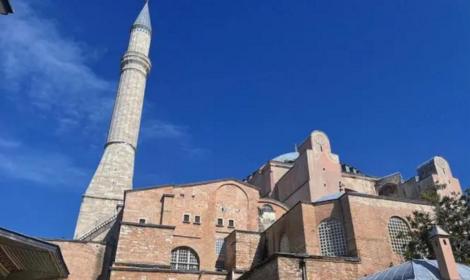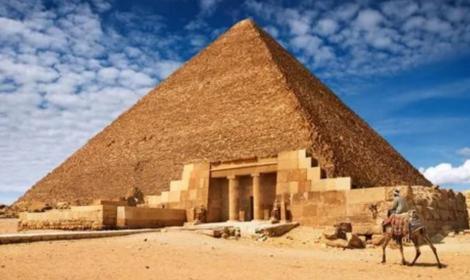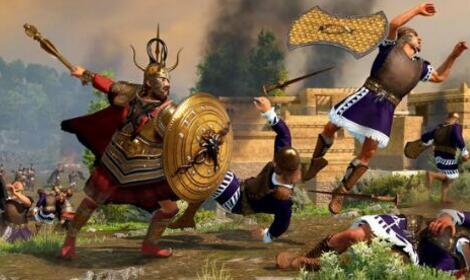罗马人是否抱怨过希腊对拉丁语的影响?
正文翻译
Carl Richard Archie
Conservative Romans, especially before Rome conquered Greece, complained about Greek culture, not the language, per se.
Let us be clear about one thing, Greece and its culture were dominant in Italy, centuries before Rome’s rise. They called this Greater Greece:
保守的罗马人,特别是在罗马征服希腊之前,抱怨的是希腊文化,而不是语言本身。
让我们明确一件事,希腊及其文化在罗马崛起之前的几个世纪就占据了意大利的主导地位。他们把这个地区称为大希腊。
The map underestimates. Naples was settled by Greeks so Greek influence extended further north than illustrated. The Romans claimed one of their kings had Greek origins. The Etruscans and Romans adopted Greek letters and numbers very early.
During the regal era and the early Republic, Romans sent officials to Greece for advice. Livy''s History of Rome:
Commissioners were sent to Athens with instructions to make a copy of the famous laws of Solon, and to investigate the institutions, customs, and laws of other Greek States.
While Rome was a village of mud huts, Greco-Italians were building things like these:
(地图)
地图低估了希腊文化的影响。那不勒斯是由希腊人定居的,所以希腊文化的影响延伸到比地图上展示的更北。罗马人声称他们的一位国王有希腊血统。伊特鲁里亚人和罗马人很早就采用了希腊字母和数字。
在王政时期和早期共和国时期,罗马派官员到希腊寻求建议。利维的《罗马史》中写道:
向雅典派遣专员,指示他们复制著名的索伦法律,并调查其他希腊城邦的体制、习俗和法律。
而当罗马还是泥屋村庄时,希腊-意大利人正在建造像这样的东西:

When Rome was very small (perhaps 30,000 people), Taranto’s population exceeded 300,000:
Rome was very poor. However, Romans were tough. Even while surrounded by giants, they remained independent. However, even 2,360 years later, you can sense a certain resentment towards their richer neighbors.
When Romans went to Campania and they saw how the Etruscans/Greeks lived, they expressed a fierce resentment: Livy''s History of Rome
当罗马非常小(可能只有3万人)时,塔兰托的人口已超过30万。罗马很贫穷,但罗马人很坚强。即使被巨人包围,他们仍然保持独立。然而,即使在2360年后的今天,你仍然能感受到他们对富裕邻国的一种怨恨。当罗马人去了坎帕尼亚并看到了伊特鲁里亚人/希腊人的生活方式时,他们表达了强烈的不满情绪:《罗马史》。
Why should people like the Campanians who were incapable of defending either their possessions or themselves enjoy the most fertile territory in Italy, and a city well worthy of its territory, in preference to a victorious army who had driven off the Samnites from it by their sweat and blood? Was it just that these people who had surrendered themselves into their power should be enjoying that fertile and delightful country while they, wearied with warfare, were struggling with the arid and pestilential soil round the City, or suffering the ruinous consequences of an ever-growing interest which were awaiting them in Rome?"
The Roman city elders claimed their poverty made them strong and tough. Well, you get the idea.
Conservative Romans believed Greek culture brought decadence, verbosity, laziness and softness. Even so, educated Romans spoke and wrote Greek.
为什么像坎帕尼亚人这样无力保护自己财产的人可以享受意大利最肥沃的土地和一座配得上这片土地的城市,而胜利的军队却要在干旱和瘟疫肆虐的土地上挣扎,或者忍受在罗马等待他们的日益增长的利息所带来的毁灭性后果呢?这些人投降并放弃力量,却享受了那富饶美妙的乡村,而他们却越来越贫瘠,更加艰难。罗马的城市长老声称他们的贫穷使他们强大坚韧。那么,你明白我的意思吧。
保守的罗马人认为希腊文化带来了颓废、冗长、懒惰和软弱。尽管如此,受过教育的罗马人仍会说和写希腊语。
So, the Romans held two opposing ideas about Greek culture, at the same time. They respected Greek culture, science and art but thought it was a corrupting influence as well. Here is a passage from the Life of Cato the Elder by Plutarch: Plutarch · Life of Cato the Elder
保守的罗马人认为希腊文化带来了颓废、繁琐、懒惰和软弱。不过,受过教育的罗马人会说和写希腊语。因此,罗马人对希腊文化有着两种相反的看法。他们尊重希腊文化、科学和艺术,但同时也认为它是一种腐败的影响。以下是普鲁塔克的《老加图的一生》中的一段话。”
…their young men lay hold of Greek culture and consort with such admirable men. But Cato, at the very outset, when this zeal for discussion came pouring into the city, was distressed, fearing lest the young men, by giving this direction to their ambition, should come to love a reputation based on mere words more than one achieved by martial deeds.
…he was wholly averse to philosophy, and made mock of all Greek culture and training, out of patriotic zeal. He says, for instance, that Socrates was a mighty prattler, who attempted, as best he could, to be his country's tyrant, by abolishing its customs, and by enticing his fellow citizens into opinions contrary to the laws.
….seeking to prejudice his son against Greek culture, he indulges in an utterance all too rash for his years, declaring, in the tone of a prophet or a seer, that Rome would lose her empire when she had become infected with Greek letters. But time has certainly shown the emptiness of this ill-boding speech of his, for while the city was at the zenith of its empire, she made every form of Greek learning and culture her own.
……他们的年轻人接触希腊文化并与这样令人钦佩的人交往。但是,开篇时,卡托很烦恼,担心年轻人性急的争论热潮会使他们更喜欢基于言辞而不是军事行为所实现的声望。
……他完全反对哲学,并因为爱国之情而嘲笑所有的希腊文化和训练。例如,他说苏格拉底很会唠叨,试图成为他的国家的暴君,通过废除其习俗,将他的同胞引入与法律相反的观点。
……试图阻挡他儿子接受希腊文化,他发表了一种完全不怕年龄不够的轻率言论,宣称当罗马被希腊字母所感染时,她将失去她的帝国。但时间肯定证明了他这种不吉利的言论的空洞,因为当城市处于帝国的巅峰时,它让各种形式的希腊学问和文化成为自己的。
It was not only Greek philosophers that he hated, but he was also suspicious of Greeks who practiced medicine at Rome. He had heard, it would seem, of Hippocrates' reply when the Great King of Persia consulted him, with the promise of a fee of many talents, namely, that he would never put his skill at the service of Barbarians who were enemies of Greece. He said all Greek physicians had taken a similar oath, and urged his son to beware of them all.
So yes, there was anti-Greek sentiment during the early and mid-Republic. However, it appeared to have disappeared after Rome conquered Greece and the Alexander successor kingdoms.
他不仅厌恶希腊哲学家,还怀疑在罗马从事医学的希腊人。他听说过希波克拉底被波斯大王请教时的回答,承诺要支付数百个人才的报酬,即他不会将自己的技艺用于希腊敌对的野蛮人身上。他表示所有希腊医生都发过类似的誓言,并敦促他的儿子警惕所有医生。
因此,在共和国早期和中期存在反希腊情绪。然而,在罗马征服希腊和亚历山大的后继王国之后,这种情绪似乎已经消失了。
By then, the Romans had settled on the assessment that Greeks were free to be clever…while they fought, conquered and commanded. Vegetius summarized:
当时,罗马人已经认定希腊人可以自由地展示他们的才华... 而在战争、征服和指挥方面则由罗马人来负责。维吉修斯总结道:
We find that the Romans owed the conquest of the world to no other cause than continual military training, exact observance of discipline in their camps and unwearied cultivation of the other arts of war. Without these, what chance would the inconsiderable numbers of the Roman armies have had against the multitudes of the Gauls? Or with what success would their small size have been opposed to the prodigious stature of the Germans? The Spaniards surpassed us not only in numbers, but in physical strength. We were always inferior to the Africans in wealth and unequal to them in deception and stratagem. And the Greeks, indisputably, were far superior to us in skill in arts and all kinds of knowledge.
So, the Roman view was, let the Greeks be clever. Romans ruled.
我们发现罗马人征服世界的原因不在于其他因素,而在于他们不断进行的军事训练、在营地中严格遵守纪律以及不懈地培养其他的战争艺术。若没有这些,罗马军队那微不足道的人数又如何能对抗高卢人的军群呢?相较于德国人巨大的身材,在数量方面更胜一筹的西班牙人在体力上也超越了我们。在财富方面,我们总是不如非洲人,也难以与他们在欺骗和策略方面抗衡。而希腊人,在艺术和各种知识技能方面无可争议地远远优于我们。因此,罗马人的观点是,让希腊人聪明去吧,罗马人才是统治者。
Conservative Romans, especially before Rome conquered Greece, complained about Greek culture, not the language, per se.
Let us be clear about one thing, Greece and its culture were dominant in Italy, centuries before Rome’s rise. They called this Greater Greece:
保守的罗马人,特别是在罗马征服希腊之前,抱怨的是希腊文化,而不是语言本身。
让我们明确一件事,希腊及其文化在罗马崛起之前的几个世纪就占据了意大利的主导地位。他们把这个地区称为大希腊。
The map underestimates. Naples was settled by Greeks so Greek influence extended further north than illustrated. The Romans claimed one of their kings had Greek origins. The Etruscans and Romans adopted Greek letters and numbers very early.
During the regal era and the early Republic, Romans sent officials to Greece for advice. Livy''s History of Rome:
Commissioners were sent to Athens with instructions to make a copy of the famous laws of Solon, and to investigate the institutions, customs, and laws of other Greek States.
While Rome was a village of mud huts, Greco-Italians were building things like these:
(地图)
地图低估了希腊文化的影响。那不勒斯是由希腊人定居的,所以希腊文化的影响延伸到比地图上展示的更北。罗马人声称他们的一位国王有希腊血统。伊特鲁里亚人和罗马人很早就采用了希腊字母和数字。
在王政时期和早期共和国时期,罗马派官员到希腊寻求建议。利维的《罗马史》中写道:
向雅典派遣专员,指示他们复制著名的索伦法律,并调查其他希腊城邦的体制、习俗和法律。
而当罗马还是泥屋村庄时,希腊-意大利人正在建造像这样的东西:

When Rome was very small (perhaps 30,000 people), Taranto’s population exceeded 300,000:
Rome was very poor. However, Romans were tough. Even while surrounded by giants, they remained independent. However, even 2,360 years later, you can sense a certain resentment towards their richer neighbors.
When Romans went to Campania and they saw how the Etruscans/Greeks lived, they expressed a fierce resentment: Livy''s History of Rome
当罗马非常小(可能只有3万人)时,塔兰托的人口已超过30万。罗马很贫穷,但罗马人很坚强。即使被巨人包围,他们仍然保持独立。然而,即使在2360年后的今天,你仍然能感受到他们对富裕邻国的一种怨恨。当罗马人去了坎帕尼亚并看到了伊特鲁里亚人/希腊人的生活方式时,他们表达了强烈的不满情绪:《罗马史》。
Why should people like the Campanians who were incapable of defending either their possessions or themselves enjoy the most fertile territory in Italy, and a city well worthy of its territory, in preference to a victorious army who had driven off the Samnites from it by their sweat and blood? Was it just that these people who had surrendered themselves into their power should be enjoying that fertile and delightful country while they, wearied with warfare, were struggling with the arid and pestilential soil round the City, or suffering the ruinous consequences of an ever-growing interest which were awaiting them in Rome?"
The Roman city elders claimed their poverty made them strong and tough. Well, you get the idea.
Conservative Romans believed Greek culture brought decadence, verbosity, laziness and softness. Even so, educated Romans spoke and wrote Greek.
为什么像坎帕尼亚人这样无力保护自己财产的人可以享受意大利最肥沃的土地和一座配得上这片土地的城市,而胜利的军队却要在干旱和瘟疫肆虐的土地上挣扎,或者忍受在罗马等待他们的日益增长的利息所带来的毁灭性后果呢?这些人投降并放弃力量,却享受了那富饶美妙的乡村,而他们却越来越贫瘠,更加艰难。罗马的城市长老声称他们的贫穷使他们强大坚韧。那么,你明白我的意思吧。
保守的罗马人认为希腊文化带来了颓废、冗长、懒惰和软弱。尽管如此,受过教育的罗马人仍会说和写希腊语。
So, the Romans held two opposing ideas about Greek culture, at the same time. They respected Greek culture, science and art but thought it was a corrupting influence as well. Here is a passage from the Life of Cato the Elder by Plutarch: Plutarch · Life of Cato the Elder
保守的罗马人认为希腊文化带来了颓废、繁琐、懒惰和软弱。不过,受过教育的罗马人会说和写希腊语。因此,罗马人对希腊文化有着两种相反的看法。他们尊重希腊文化、科学和艺术,但同时也认为它是一种腐败的影响。以下是普鲁塔克的《老加图的一生》中的一段话。”
…their young men lay hold of Greek culture and consort with such admirable men. But Cato, at the very outset, when this zeal for discussion came pouring into the city, was distressed, fearing lest the young men, by giving this direction to their ambition, should come to love a reputation based on mere words more than one achieved by martial deeds.
…he was wholly averse to philosophy, and made mock of all Greek culture and training, out of patriotic zeal. He says, for instance, that Socrates was a mighty prattler, who attempted, as best he could, to be his country's tyrant, by abolishing its customs, and by enticing his fellow citizens into opinions contrary to the laws.
….seeking to prejudice his son against Greek culture, he indulges in an utterance all too rash for his years, declaring, in the tone of a prophet or a seer, that Rome would lose her empire when she had become infected with Greek letters. But time has certainly shown the emptiness of this ill-boding speech of his, for while the city was at the zenith of its empire, she made every form of Greek learning and culture her own.
……他们的年轻人接触希腊文化并与这样令人钦佩的人交往。但是,开篇时,卡托很烦恼,担心年轻人性急的争论热潮会使他们更喜欢基于言辞而不是军事行为所实现的声望。
……他完全反对哲学,并因为爱国之情而嘲笑所有的希腊文化和训练。例如,他说苏格拉底很会唠叨,试图成为他的国家的暴君,通过废除其习俗,将他的同胞引入与法律相反的观点。
……试图阻挡他儿子接受希腊文化,他发表了一种完全不怕年龄不够的轻率言论,宣称当罗马被希腊字母所感染时,她将失去她的帝国。但时间肯定证明了他这种不吉利的言论的空洞,因为当城市处于帝国的巅峰时,它让各种形式的希腊学问和文化成为自己的。
It was not only Greek philosophers that he hated, but he was also suspicious of Greeks who practiced medicine at Rome. He had heard, it would seem, of Hippocrates' reply when the Great King of Persia consulted him, with the promise of a fee of many talents, namely, that he would never put his skill at the service of Barbarians who were enemies of Greece. He said all Greek physicians had taken a similar oath, and urged his son to beware of them all.
So yes, there was anti-Greek sentiment during the early and mid-Republic. However, it appeared to have disappeared after Rome conquered Greece and the Alexander successor kingdoms.
他不仅厌恶希腊哲学家,还怀疑在罗马从事医学的希腊人。他听说过希波克拉底被波斯大王请教时的回答,承诺要支付数百个人才的报酬,即他不会将自己的技艺用于希腊敌对的野蛮人身上。他表示所有希腊医生都发过类似的誓言,并敦促他的儿子警惕所有医生。
因此,在共和国早期和中期存在反希腊情绪。然而,在罗马征服希腊和亚历山大的后继王国之后,这种情绪似乎已经消失了。
By then, the Romans had settled on the assessment that Greeks were free to be clever…while they fought, conquered and commanded. Vegetius summarized:
当时,罗马人已经认定希腊人可以自由地展示他们的才华... 而在战争、征服和指挥方面则由罗马人来负责。维吉修斯总结道:
We find that the Romans owed the conquest of the world to no other cause than continual military training, exact observance of discipline in their camps and unwearied cultivation of the other arts of war. Without these, what chance would the inconsiderable numbers of the Roman armies have had against the multitudes of the Gauls? Or with what success would their small size have been opposed to the prodigious stature of the Germans? The Spaniards surpassed us not only in numbers, but in physical strength. We were always inferior to the Africans in wealth and unequal to them in deception and stratagem. And the Greeks, indisputably, were far superior to us in skill in arts and all kinds of knowledge.
So, the Roman view was, let the Greeks be clever. Romans ruled.
我们发现罗马人征服世界的原因不在于其他因素,而在于他们不断进行的军事训练、在营地中严格遵守纪律以及不懈地培养其他的战争艺术。若没有这些,罗马军队那微不足道的人数又如何能对抗高卢人的军群呢?相较于德国人巨大的身材,在数量方面更胜一筹的西班牙人在体力上也超越了我们。在财富方面,我们总是不如非洲人,也难以与他们在欺骗和策略方面抗衡。而希腊人,在艺术和各种知识技能方面无可争议地远远优于我们。因此,罗马人的观点是,让希腊人聪明去吧,罗马人才是统治者。
评论翻译
Dimitrios Chronopoulos
The mere fact that Julius Caesar’s last words (“You Brutus”) while dying were pronounced by him in Greek (because he had a Greek nurse from boyhood) is enough proof of the influence that the Greek language (and by extension the Greek culture) exercised on Rome.
仅仅是因为恺撒大帝临终前说的最后一句话(“是你吗,布鲁图!”)是用希腊语说的(因为他从小就有一名希腊护士),这就足以证明希腊语言(以及希腊文化)对罗马的影响。
Massimo Battistin
Right, ancient Roman elites were deeply, hellenised, so to say; ancient Greek was commonly spoken amongst them, the Romans conquered the world by the strength of their legions, the Greeks conquered entire world by the strength of their culture, with no ancient Greek heritage Western Civilisation had never come to light and it could never gain world supremacy since with no Greek Philosophy, Literature, Fine Arts, Architecture, Science most of human mankind would be still in the caves, just for instance Euclid’s “The Elements” that dates back some 2300 years ago is the ground of entire Mathematics, i hope that Greek people remind this often.
古罗马精英深深希腊化,可以这么说;古希腊语在他们中间是普遍使用的,罗马人通过军团的力量征服了世界,而希腊人则凭借他们文化的力量征服了整个世界。如果没有古希腊的遗产,西方文明就不会出现,也永远无法取得世界的主导地位,因为如果没有希腊哲学、文学、美术、建筑和科学等方面的贡献,大部分人类仍然生活在洞穴里。例如,欧几里得的《几何原本》,它的历史可以追溯到大约2300年前,是整个数学的基础,我希望希腊人经常提醒自己这一点。
Enrico Manno
Romans they had the best army of the antiquity.. but they spread Roman Civilization on the three continents with the foundation of cities with all the infrastructure tipical of Rome
The Forum.. Senate.. Written Laws. Roads.. Baths.. Theatre…Fire brigade.. police department
Aqueducts.. Postal service etc etc
In Rome even a slave or a gladiator can gain his freedom.
I read something about the Romans that copied the Roman numerals from the Greeks…I am really astonished.
罗马人拥有古代最强大的军队,但他们通过建立具有罗马特色的城市基础设施,在三个大陆上传播了罗马文明。例如论坛、参议院、书面法律、道路、浴场、剧院、消防队和警察部门、引渡水管和邮政服务等等。在罗马,甚至一个奴隶或角斗士也可以获得自由。我读到一些关于罗马人从希腊人那里抄袭罗马数字的事情,我感到非常惊讶。
John Ramage
I read the famous Wheelock’s Latin and several books in Latin, and I know quite a bit of ancient history. Romans were afraid that Greek manners, Greek luxury and Greek effeminacy would vitiate their morals and remove the simplicity, frugality, toughness and commonsense for which they were renowned.
In fact, after Rome conquered Carthage and Greece, something far worse started to occur. Vast sums of money that had previously been shared between other states, suddenly went to Rome itself. Gigantic fortunes were made, and this led to political corruption, and bribery, which in turn weakened the political system. Also, the army which was now so successful, was increasingly a threat to the republic
我读过著名的《韦洛克拉丁语》和几本拉丁语书籍,我对古代历史也有相当了解。罗马人担心希腊风气、奢华和柔弱会玷污他们的道德观念,并破坏了他们以简朴、节俭、坚韧和常识而闻名的生活方式。
事实上,在罗马征服迦太基和希腊之后,更糟糕的事情开始发生。先前曾共享给其他国家的巨额资金突然流向了罗马本身。大量财富被创造出来,这导致政治上的腐败和贿赂,反过来又削弱了政治体系。此外,如今非常成功的军队逐渐成为共和国的威胁。
Stelios
Also it must be mentioned that etruscans and rome start to flourish after troy fall to the spartans.romilus and romios father(founters of rome) was aentas that he was a trojan and his mother was aphrodite a greek godess.Trojans descent from 1 of the 4 main pre greek races that later formed the Hellenes . So romans where of greek descent . In a way rome continued alexanders the great work,to spread the greek culture and civilize the barbarians.alexander did it east and the romans west
还应该提到的是,伊特鲁斯卡人和罗马人在特洛伊沦陷于斯巴达之后开始繁荣发展。罗马城的创始人罗密乌斯的父亲是阿涅亚斯,他是特洛伊人,母亲是希腊女神阿芙罗狄蒂。特洛伊人是四个主要前希腊种族之一,后来成为了希腊人的一部分。因此,罗马人是希腊血统的。从某种意义上说,罗马延续了亚历山大大帝的工作,传播希腊文化并文明野蛮人。亚历山大大帝向东方传播,而罗马向西方传播。
Enrico Manno
I am really fed up with this vision of the history…for some people nobody invented anything but just copied from other countries…I found this attitude quite ridiculous…Romans they copied from the Greeks that copied from the Egyptians or the Sumerians
Or by the Nubians according to the afrocentric view of the history.
Some people are claiming that the Persians were more civilized than the Greeks…without solid evidence on written papers or clay.. Etc etc etc
Well I have a different view of the history
How come nobody mentioned the first great European civilization.. the Minoan Civilization on the island of Crete parallel to the first Egyptian dinastie of 3200 B.C.?
And then the Mycenaean Civilization on Greek mainland?
我真的对这种历史观感到厌倦了……对于某些人来说,似乎没有人发明了任何东西,只是从其他国家抄袭……我发现这种态度非常荒谬……罗马人从希腊人那里抄袭,希腊人从埃及人或苏美尔人那里抄袭,或是根据非洲中心史观是从努比亚人那里抄袭。有些人声称波斯人比希腊人更文明……没有实际证据,只是写在纸上或粘在泥上等等等等。嗯,我对历史有不同的看法。怎么没人提到第一个伟大的欧洲文明……克里特岛上的米诺斯文明,与公元前3200年的第一批埃及王朝并行?接着是希腊大陆上的迈锡尼文明?
Anton Mikofsky
You didn’t mention the Olympics. Greek — but also very physical. Held in very high esteem by the Romans! That ego-freak Nero fancied himself a great chariot racer. So he ORDERED the Greeks to hold an out-of-year Olympics just so he could go, enter and be crowned CHAMPION. (All rigged, as usual.) — Suetonius
你没有提到奥林匹克运动会。希腊人的奥林匹克运动会非常注重体育,而这一点也深受罗马人的推崇!那个自我膨胀的恩帝罗认为自己是一个伟大的战车赛手,所以他下令希腊人举办一次非正式的奥林匹克运动会,只为了让他可以参加比赛并成为冠军(一如既往地作弊)——《苏埃托尼乌斯传》。
Daniel
Envy is something that even the Romans experienced. Thank God they did not have Social Media at the time.
嫉妒是连罗马人都经历过的情感。感谢上帝,他们当时没有社交媒体。
Kristian Vladimirovich Schmitt
The Etruscans wrote from right to left with older Pheonician letters. They likely started to write independent from the Greeks.
伊特鲁里亚人用较早的腓尼基字母从右到左书写。他们可能开始独立于希腊人书写。
Demetrios Theodorou
The Greeks initially also wrote from right to left, from top to bottom and boustrophedon
it was only after the fifth century that they kept the “left to right” writing -firstly probably in Athens - and of course it took decades to be adopted by the remote colonies and dialects
希腊人最初也是从右到左、从上到下书写,并采用来回曲折排版方式。直到公元五世纪,他们才开始采用“从左到右”的书写方式——可能最先是在雅典——当然这需要几十年时间才能被遥远的殖民地和方言所接受。
Frixos Tsifrikas
“They likely started to write independent from the Greeks”.. You’ve drawn a major conclusion by stating one of the characteristics without bothering to look any further.. Did you not see that the Eubean alphabet which we know (do you need bibliography?) was used for the etruscan alphabet was written from right to left?
“他们可能开始独立于希腊人书写”这句话,你只是通过陈述一个特征就得出了一个重要结论。难道你没有看到我们所知道的欧巴伊字母表被用于书写伊特鲁里亚字母时也是从右到左书写的吗?(如果需要参考资料,请告诉我)
Erick Behari
Outnumbered Romans ? Rome lost thousand soldiers during Hannibal campaing and still were able to rise new armies and destroy Carthage , Rome while fighting Hannibal opened new wars so no Romans were not few in number as this guy wrotten
罗马人数量不足?在汉尼拔与坎尼之战中,罗马失去了成千上万的士兵,但仍然能够组建新的军队并摧毁迦太基。在与汉尼拔作战时,罗马还开辟了新的战争,因此罗马人并不人数稀少,就像这个人所说的那样。
Sean Goodwin
For a segment of the Roman historians, absolutely. In particular, Livy does it throughout his history. Every chance he gets to take a cheap shot at the Greeks he seems to take it. And although they were Greek, they were Eastern and that is close enough, there are moment in Aeneid where Virgil dwells on some of the more vain features of the culture.
对于一部分罗马历史学家来说,绝对是这样。特别是在他的历史著作中,利维 Livy 就是这么做的。每当他有机会挖苦希腊人时,他似乎总是会抓住这个机会。虽然他们是希腊人,但他们是东方人,这已经足够接近了,在弥尔顿的《埃涅阿斯纪》中也有一些关于该文化更虚荣特点的描写。
Val Hadjiyski
Why then then “graeca sunt, non leguntur?
Why Latin persisted in Western Europe for many centuries and gave rise to several modern languages (except Romanian, of course), while Greek disappeared not only from the Middle East, Asia Minor and North Africa, but also from most of the Balkans, and across Eastern Europe, Cyrillic writing and Old Bulgarian (Church Slavonic) idiom spread instead?
那么,“graeca sunt, non leguntur”(希腊文必须学,但不必读)为什么会出现呢?为什么拉丁语在西欧存续了几个世纪并催生了几种现代语言(当然不包括罗马尼亚语),而希腊语不仅在中东、小亚细亚和北非消失了,而且在大部分巴尔干地区和整个东欧地区,西里尔字母和旧保加利亚语(教会斯拉夫语)逐渐传播?
Carl Richard Archie
To some degree it was. The Greeks appreciated things like fine art, architecture, rhetoric, plays, etc.
Some Romans appreciated these things too. Conservative Romans were notoriously blunt and simple and viewed such things with suspicion.
For example, Cato had a strong dislike of Scipio Africanus and often criticized him for his open appreciation of Greek culture.
Yet, even Cato must have admitted, Scipio was an excellent soldier and innovative leader of men. Appreciation of Greek things did make a person, wimpy. Yet Cato kept on claiming corruption.
However, I sense a country folk “glorification” of their simplicity and primitive state…and claim it as virtue. Much of it was utter nonsense.
在某种程度上是这样的。希腊人欣赏精美的艺术、建筑、修辞、戏剧等。有些罗马人也欣赏这些东西。保守的罗马人以其粗糙和简单而出名,并对这些事物持怀疑态度。例如,卡托(Cato)非常不喜欢斯基比奥·阿非利卡努斯(Scipio Africanus),经常批评他对希腊文化的公开欣赏。但是,即使是卡托也不得不承认,斯基比奥是一个出色的士兵和创新的领导者。欣赏希腊事物并不会使人软弱。然而,卡托一直声称这是腐败的表现。我感觉到了某种乡村人对自己简单和原始状态的 "美化" ,并将其视为美德,但其中许多都是无稽之谈。
Amadeu Macedo DaSilva
While I have no intention to antagonize the answer provided by Mr. Archie, who argued that traditional Romans complained about the Greek language, I understand that most Romans, specially those who lived during the late Roman Republic, and particularly the Roman Empire subjects simply adored literally anything that was “Greek.” In fact, most of its nobility either employed Greek intellectuals or acquired those who had been sold into Slavery to become tutors of their their children (including some of the girls such as Livia, the second wife of Emperor Augustus Caesar). Speaking of Augustus, he often included Greek Orators (some of which Philosophers) to entertain the imperial family during his nightly extravagant banquets. Most importantly, since the time after Rome conquered Greece, they fully absorbed the rich, ancient Hellenic culture, including its architecture style and, particularly their (mythologic) religion, where they have only changed the divinities’ names (such as Zeus-Jupiter, Hera-Minerva, Poseidon-Neptune, Aphrodite-Venus, etc.)
Finally, it should be noted that, the southern portion of the Italic peninsula had become a region dotted with small Greek colonies, which was eventually incorporated into Roman territory under the name “Magna Grecia.”
虽然我没有任何敌意反驳 Archie 先生提供的答案,他认为传统的罗马人抱怨希腊语言,但我认为大多数罗马人,特别是生活在罗马共和国末期和罗马帝国时期的人们,简直崇拜一切来自“希腊”的东西。事实上,大部分贵族都雇用希腊知识分子或购买那些被卖为奴隶的人来担任他们孩子的家庭教师,包括一些女孩,如奥古斯都大帝的第二任妻子莉薇娅。说到奥古斯都,他经常邀请希腊演讲家(其中一些是哲学家)在他夜间的奢华宴会上为皇室家族提供娱乐。最重要的是,自从罗马征服希腊以来,他们完全吸收了丰富的、古老的希腊文化,包括其建筑风格和特别是他们(神话)宗教,其中罗马只是更改了神祇的名字(如宙斯-朱庇特、赫拉-米涅瓦、波塞冬-海神、阿芙罗蒂-维纳斯等等)。
最后,值得注意的是,意大利南部半岛已成为遍布小希腊殖民地的地区,最终被并入罗马领土,名为“大希腊”。
Guanchen Wang
Sure did. There was a famous story about Tiberius trying to remove Greek influences from Latin but because there was no Latin word to replace the phrase “gold inlay” he banned any statue with gold inlay in them.
的确如此。有一个著名的故事,讲述了提比略试图从拉丁语中删除希腊影响的故事,但由于没有拉丁文单词可以替代“嵌金”这个短语,他禁止任何嵌有金子的雕像。
Bacharias Konstantinos
As far as I know the Romans were super satisfied for the Greek contribution and “vaccination”(to be actual and up to date…) of their civilization not only for the language but for every aspect of this life on the planet!!!
Their contact with the Greeks gave them a gratis upgrade(Microsoft would had asked trillions for that upgrade…) to higher level of their existence in general. The ancient Romans were conscious and thank full about this fact.
It is only the modern Romans(and the most of the westerners, included, today) that start to forget their origin of their civilization… .
据我所知,罗马人对希腊对他们的文明做出的贡献和“接种”(为了保持现实和最新...)非常满意,不仅仅是语言,而是生活的方方面面!他们与希腊人的联系使他们的整体存在水平得到了免费升级(如果是微软就要索价数万亿...)。古罗马人对这个事实是有意识和感激的。只有现代罗马人(包括今天的大多数西方人)才开始忘记他们文明的起源...。
Dimitri Lostromos
There certainly were the powers that mistrusted and maybe feared the Greeks but they took the view of Cato, “let them “prattle on”, action is what counts, and he does have a point, I imagine the Greeks during the 300 years of the Hellenistic period were too busy looking for Eudaimonia and wisdom, the Romans were more interested in conquering other places and Greece was one of the first, food for thought, If you want to have peace be prepared for war.
当然有些势力不信任并可能害怕希腊人,但他们采取了卡托的观点,“让他们空谈”,行动才是最重要的,他说得也有道理。我想,在希腊的三百年的希腊化时期,希腊人忙于寻求幸福和智慧,而罗马人更感兴趣的是征服其他地方,而希腊则是第一个被征服的国家。这值得深思,如果你想拥有和平,就要准备战争。
Goutamkumar Oinam (ꯒꯧꯇꯝꯀꯨꯃꯥꯔ ꯑꯣꯏꯅꯥꯝ)
Very nice!
I have heard that Romans treated their slaves very harshly. But even after Romans conquered the Greeks, they employed Greek tutors for their Roman children to teach them Greek lessons. That's very interesting. With this logic, I think that Romans might have not treated the Greeks very harshly like to those Celtics, though they have politically conquered the Greeks.
In this case, I think the cultural conquering of the Romans by the Greeks, is highly significant.
非常好!我听说罗马人对待自己的奴隶非常残酷。但即使在罗马人征服希腊后,他们也雇用了希腊家庭教师来教导他们的罗马孩子学习希腊语课程,这非常有趣。按照这种逻辑,我认为罗马人可能并没有像对待凯尔特人那样残酷地对待希腊人,尽管他们在政治上征服了希腊。在这种情况下,我认为希腊人通过文化征服罗马人,具有极其重要的意义。
The mere fact that Julius Caesar’s last words (“You Brutus”) while dying were pronounced by him in Greek (because he had a Greek nurse from boyhood) is enough proof of the influence that the Greek language (and by extension the Greek culture) exercised on Rome.
仅仅是因为恺撒大帝临终前说的最后一句话(“是你吗,布鲁图!”)是用希腊语说的(因为他从小就有一名希腊护士),这就足以证明希腊语言(以及希腊文化)对罗马的影响。
Massimo Battistin
Right, ancient Roman elites were deeply, hellenised, so to say; ancient Greek was commonly spoken amongst them, the Romans conquered the world by the strength of their legions, the Greeks conquered entire world by the strength of their culture, with no ancient Greek heritage Western Civilisation had never come to light and it could never gain world supremacy since with no Greek Philosophy, Literature, Fine Arts, Architecture, Science most of human mankind would be still in the caves, just for instance Euclid’s “The Elements” that dates back some 2300 years ago is the ground of entire Mathematics, i hope that Greek people remind this often.
古罗马精英深深希腊化,可以这么说;古希腊语在他们中间是普遍使用的,罗马人通过军团的力量征服了世界,而希腊人则凭借他们文化的力量征服了整个世界。如果没有古希腊的遗产,西方文明就不会出现,也永远无法取得世界的主导地位,因为如果没有希腊哲学、文学、美术、建筑和科学等方面的贡献,大部分人类仍然生活在洞穴里。例如,欧几里得的《几何原本》,它的历史可以追溯到大约2300年前,是整个数学的基础,我希望希腊人经常提醒自己这一点。
Enrico Manno
Romans they had the best army of the antiquity.. but they spread Roman Civilization on the three continents with the foundation of cities with all the infrastructure tipical of Rome
The Forum.. Senate.. Written Laws. Roads.. Baths.. Theatre…Fire brigade.. police department
Aqueducts.. Postal service etc etc
In Rome even a slave or a gladiator can gain his freedom.
I read something about the Romans that copied the Roman numerals from the Greeks…I am really astonished.
罗马人拥有古代最强大的军队,但他们通过建立具有罗马特色的城市基础设施,在三个大陆上传播了罗马文明。例如论坛、参议院、书面法律、道路、浴场、剧院、消防队和警察部门、引渡水管和邮政服务等等。在罗马,甚至一个奴隶或角斗士也可以获得自由。我读到一些关于罗马人从希腊人那里抄袭罗马数字的事情,我感到非常惊讶。
John Ramage
I read the famous Wheelock’s Latin and several books in Latin, and I know quite a bit of ancient history. Romans were afraid that Greek manners, Greek luxury and Greek effeminacy would vitiate their morals and remove the simplicity, frugality, toughness and commonsense for which they were renowned.
In fact, after Rome conquered Carthage and Greece, something far worse started to occur. Vast sums of money that had previously been shared between other states, suddenly went to Rome itself. Gigantic fortunes were made, and this led to political corruption, and bribery, which in turn weakened the political system. Also, the army which was now so successful, was increasingly a threat to the republic
我读过著名的《韦洛克拉丁语》和几本拉丁语书籍,我对古代历史也有相当了解。罗马人担心希腊风气、奢华和柔弱会玷污他们的道德观念,并破坏了他们以简朴、节俭、坚韧和常识而闻名的生活方式。
事实上,在罗马征服迦太基和希腊之后,更糟糕的事情开始发生。先前曾共享给其他国家的巨额资金突然流向了罗马本身。大量财富被创造出来,这导致政治上的腐败和贿赂,反过来又削弱了政治体系。此外,如今非常成功的军队逐渐成为共和国的威胁。
Stelios
Also it must be mentioned that etruscans and rome start to flourish after troy fall to the spartans.romilus and romios father(founters of rome) was aentas that he was a trojan and his mother was aphrodite a greek godess.Trojans descent from 1 of the 4 main pre greek races that later formed the Hellenes . So romans where of greek descent . In a way rome continued alexanders the great work,to spread the greek culture and civilize the barbarians.alexander did it east and the romans west
还应该提到的是,伊特鲁斯卡人和罗马人在特洛伊沦陷于斯巴达之后开始繁荣发展。罗马城的创始人罗密乌斯的父亲是阿涅亚斯,他是特洛伊人,母亲是希腊女神阿芙罗狄蒂。特洛伊人是四个主要前希腊种族之一,后来成为了希腊人的一部分。因此,罗马人是希腊血统的。从某种意义上说,罗马延续了亚历山大大帝的工作,传播希腊文化并文明野蛮人。亚历山大大帝向东方传播,而罗马向西方传播。
Enrico Manno
I am really fed up with this vision of the history…for some people nobody invented anything but just copied from other countries…I found this attitude quite ridiculous…Romans they copied from the Greeks that copied from the Egyptians or the Sumerians
Or by the Nubians according to the afrocentric view of the history.
Some people are claiming that the Persians were more civilized than the Greeks…without solid evidence on written papers or clay.. Etc etc etc
Well I have a different view of the history
How come nobody mentioned the first great European civilization.. the Minoan Civilization on the island of Crete parallel to the first Egyptian dinastie of 3200 B.C.?
And then the Mycenaean Civilization on Greek mainland?
我真的对这种历史观感到厌倦了……对于某些人来说,似乎没有人发明了任何东西,只是从其他国家抄袭……我发现这种态度非常荒谬……罗马人从希腊人那里抄袭,希腊人从埃及人或苏美尔人那里抄袭,或是根据非洲中心史观是从努比亚人那里抄袭。有些人声称波斯人比希腊人更文明……没有实际证据,只是写在纸上或粘在泥上等等等等。嗯,我对历史有不同的看法。怎么没人提到第一个伟大的欧洲文明……克里特岛上的米诺斯文明,与公元前3200年的第一批埃及王朝并行?接着是希腊大陆上的迈锡尼文明?
Anton Mikofsky
You didn’t mention the Olympics. Greek — but also very physical. Held in very high esteem by the Romans! That ego-freak Nero fancied himself a great chariot racer. So he ORDERED the Greeks to hold an out-of-year Olympics just so he could go, enter and be crowned CHAMPION. (All rigged, as usual.) — Suetonius
你没有提到奥林匹克运动会。希腊人的奥林匹克运动会非常注重体育,而这一点也深受罗马人的推崇!那个自我膨胀的恩帝罗认为自己是一个伟大的战车赛手,所以他下令希腊人举办一次非正式的奥林匹克运动会,只为了让他可以参加比赛并成为冠军(一如既往地作弊)——《苏埃托尼乌斯传》。
Daniel
Envy is something that even the Romans experienced. Thank God they did not have Social Media at the time.
嫉妒是连罗马人都经历过的情感。感谢上帝,他们当时没有社交媒体。
Kristian Vladimirovich Schmitt
The Etruscans wrote from right to left with older Pheonician letters. They likely started to write independent from the Greeks.
伊特鲁里亚人用较早的腓尼基字母从右到左书写。他们可能开始独立于希腊人书写。
Demetrios Theodorou
The Greeks initially also wrote from right to left, from top to bottom and boustrophedon
it was only after the fifth century that they kept the “left to right” writing -firstly probably in Athens - and of course it took decades to be adopted by the remote colonies and dialects
希腊人最初也是从右到左、从上到下书写,并采用来回曲折排版方式。直到公元五世纪,他们才开始采用“从左到右”的书写方式——可能最先是在雅典——当然这需要几十年时间才能被遥远的殖民地和方言所接受。
Frixos Tsifrikas
“They likely started to write independent from the Greeks”.. You’ve drawn a major conclusion by stating one of the characteristics without bothering to look any further.. Did you not see that the Eubean alphabet which we know (do you need bibliography?) was used for the etruscan alphabet was written from right to left?
“他们可能开始独立于希腊人书写”这句话,你只是通过陈述一个特征就得出了一个重要结论。难道你没有看到我们所知道的欧巴伊字母表被用于书写伊特鲁里亚字母时也是从右到左书写的吗?(如果需要参考资料,请告诉我)
Erick Behari
Outnumbered Romans ? Rome lost thousand soldiers during Hannibal campaing and still were able to rise new armies and destroy Carthage , Rome while fighting Hannibal opened new wars so no Romans were not few in number as this guy wrotten
罗马人数量不足?在汉尼拔与坎尼之战中,罗马失去了成千上万的士兵,但仍然能够组建新的军队并摧毁迦太基。在与汉尼拔作战时,罗马还开辟了新的战争,因此罗马人并不人数稀少,就像这个人所说的那样。
Sean Goodwin
For a segment of the Roman historians, absolutely. In particular, Livy does it throughout his history. Every chance he gets to take a cheap shot at the Greeks he seems to take it. And although they were Greek, they were Eastern and that is close enough, there are moment in Aeneid where Virgil dwells on some of the more vain features of the culture.
对于一部分罗马历史学家来说,绝对是这样。特别是在他的历史著作中,利维 Livy 就是这么做的。每当他有机会挖苦希腊人时,他似乎总是会抓住这个机会。虽然他们是希腊人,但他们是东方人,这已经足够接近了,在弥尔顿的《埃涅阿斯纪》中也有一些关于该文化更虚荣特点的描写。
Val Hadjiyski
Why then then “graeca sunt, non leguntur?
Why Latin persisted in Western Europe for many centuries and gave rise to several modern languages (except Romanian, of course), while Greek disappeared not only from the Middle East, Asia Minor and North Africa, but also from most of the Balkans, and across Eastern Europe, Cyrillic writing and Old Bulgarian (Church Slavonic) idiom spread instead?
那么,“graeca sunt, non leguntur”(希腊文必须学,但不必读)为什么会出现呢?为什么拉丁语在西欧存续了几个世纪并催生了几种现代语言(当然不包括罗马尼亚语),而希腊语不仅在中东、小亚细亚和北非消失了,而且在大部分巴尔干地区和整个东欧地区,西里尔字母和旧保加利亚语(教会斯拉夫语)逐渐传播?
Carl Richard Archie
To some degree it was. The Greeks appreciated things like fine art, architecture, rhetoric, plays, etc.
Some Romans appreciated these things too. Conservative Romans were notoriously blunt and simple and viewed such things with suspicion.
For example, Cato had a strong dislike of Scipio Africanus and often criticized him for his open appreciation of Greek culture.
Yet, even Cato must have admitted, Scipio was an excellent soldier and innovative leader of men. Appreciation of Greek things did make a person, wimpy. Yet Cato kept on claiming corruption.
However, I sense a country folk “glorification” of their simplicity and primitive state…and claim it as virtue. Much of it was utter nonsense.
在某种程度上是这样的。希腊人欣赏精美的艺术、建筑、修辞、戏剧等。有些罗马人也欣赏这些东西。保守的罗马人以其粗糙和简单而出名,并对这些事物持怀疑态度。例如,卡托(Cato)非常不喜欢斯基比奥·阿非利卡努斯(Scipio Africanus),经常批评他对希腊文化的公开欣赏。但是,即使是卡托也不得不承认,斯基比奥是一个出色的士兵和创新的领导者。欣赏希腊事物并不会使人软弱。然而,卡托一直声称这是腐败的表现。我感觉到了某种乡村人对自己简单和原始状态的 "美化" ,并将其视为美德,但其中许多都是无稽之谈。
Amadeu Macedo DaSilva
While I have no intention to antagonize the answer provided by Mr. Archie, who argued that traditional Romans complained about the Greek language, I understand that most Romans, specially those who lived during the late Roman Republic, and particularly the Roman Empire subjects simply adored literally anything that was “Greek.” In fact, most of its nobility either employed Greek intellectuals or acquired those who had been sold into Slavery to become tutors of their their children (including some of the girls such as Livia, the second wife of Emperor Augustus Caesar). Speaking of Augustus, he often included Greek Orators (some of which Philosophers) to entertain the imperial family during his nightly extravagant banquets. Most importantly, since the time after Rome conquered Greece, they fully absorbed the rich, ancient Hellenic culture, including its architecture style and, particularly their (mythologic) religion, where they have only changed the divinities’ names (such as Zeus-Jupiter, Hera-Minerva, Poseidon-Neptune, Aphrodite-Venus, etc.)
Finally, it should be noted that, the southern portion of the Italic peninsula had become a region dotted with small Greek colonies, which was eventually incorporated into Roman territory under the name “Magna Grecia.”
虽然我没有任何敌意反驳 Archie 先生提供的答案,他认为传统的罗马人抱怨希腊语言,但我认为大多数罗马人,特别是生活在罗马共和国末期和罗马帝国时期的人们,简直崇拜一切来自“希腊”的东西。事实上,大部分贵族都雇用希腊知识分子或购买那些被卖为奴隶的人来担任他们孩子的家庭教师,包括一些女孩,如奥古斯都大帝的第二任妻子莉薇娅。说到奥古斯都,他经常邀请希腊演讲家(其中一些是哲学家)在他夜间的奢华宴会上为皇室家族提供娱乐。最重要的是,自从罗马征服希腊以来,他们完全吸收了丰富的、古老的希腊文化,包括其建筑风格和特别是他们(神话)宗教,其中罗马只是更改了神祇的名字(如宙斯-朱庇特、赫拉-米涅瓦、波塞冬-海神、阿芙罗蒂-维纳斯等等)。
最后,值得注意的是,意大利南部半岛已成为遍布小希腊殖民地的地区,最终被并入罗马领土,名为“大希腊”。
Guanchen Wang
Sure did. There was a famous story about Tiberius trying to remove Greek influences from Latin but because there was no Latin word to replace the phrase “gold inlay” he banned any statue with gold inlay in them.
的确如此。有一个著名的故事,讲述了提比略试图从拉丁语中删除希腊影响的故事,但由于没有拉丁文单词可以替代“嵌金”这个短语,他禁止任何嵌有金子的雕像。
Bacharias Konstantinos
As far as I know the Romans were super satisfied for the Greek contribution and “vaccination”(to be actual and up to date…) of their civilization not only for the language but for every aspect of this life on the planet!!!
Their contact with the Greeks gave them a gratis upgrade(Microsoft would had asked trillions for that upgrade…) to higher level of their existence in general. The ancient Romans were conscious and thank full about this fact.
It is only the modern Romans(and the most of the westerners, included, today) that start to forget their origin of their civilization… .
据我所知,罗马人对希腊对他们的文明做出的贡献和“接种”(为了保持现实和最新...)非常满意,不仅仅是语言,而是生活的方方面面!他们与希腊人的联系使他们的整体存在水平得到了免费升级(如果是微软就要索价数万亿...)。古罗马人对这个事实是有意识和感激的。只有现代罗马人(包括今天的大多数西方人)才开始忘记他们文明的起源...。
Dimitri Lostromos
There certainly were the powers that mistrusted and maybe feared the Greeks but they took the view of Cato, “let them “prattle on”, action is what counts, and he does have a point, I imagine the Greeks during the 300 years of the Hellenistic period were too busy looking for Eudaimonia and wisdom, the Romans were more interested in conquering other places and Greece was one of the first, food for thought, If you want to have peace be prepared for war.
当然有些势力不信任并可能害怕希腊人,但他们采取了卡托的观点,“让他们空谈”,行动才是最重要的,他说得也有道理。我想,在希腊的三百年的希腊化时期,希腊人忙于寻求幸福和智慧,而罗马人更感兴趣的是征服其他地方,而希腊则是第一个被征服的国家。这值得深思,如果你想拥有和平,就要准备战争。
Goutamkumar Oinam (ꯒꯧꯇꯝꯀꯨꯃꯥꯔ ꯑꯣꯏꯅꯥꯝ)
Very nice!
I have heard that Romans treated their slaves very harshly. But even after Romans conquered the Greeks, they employed Greek tutors for their Roman children to teach them Greek lessons. That's very interesting. With this logic, I think that Romans might have not treated the Greeks very harshly like to those Celtics, though they have politically conquered the Greeks.
In this case, I think the cultural conquering of the Romans by the Greeks, is highly significant.
非常好!我听说罗马人对待自己的奴隶非常残酷。但即使在罗马人征服希腊后,他们也雇用了希腊家庭教师来教导他们的罗马孩子学习希腊语课程,这非常有趣。按照这种逻辑,我认为罗马人可能并没有像对待凯尔特人那样残酷地对待希腊人,尽管他们在政治上征服了希腊。在这种情况下,我认为希腊人通过文化征服罗马人,具有极其重要的意义。









